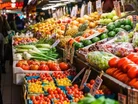How China's tariff hike will impact US food exports such as pork, fruit and wine

China has implemented tariffs of up to 25% on 128 US imports, many of which are food and agricultural products, after US President Donald Trump raised duties on foreign steel and aluminium imports last month.
Affecting around $3bn of imports, China’s ministry of commerce said that it would be “suspending tariff concessions” on 120 US food products, including wine, pork, apples, oranges, and dried nuts.
Exported US pork products will be hit by a 25% duty while wine, fresh and dried fruit and nuts from the US will be charged a 15% tariff.
According to reports, other commodities to be taxed include apples, pears, oranges, cherries, strawberries, peaches, lemons, mandarins, plums, almonds, cashews, pistachios and walnuts.
The tariffs mirror President Trump’s 25% charge on imported steel and 15% hike on aluminium, which has raised uncertainty about the possibility of a trade war between the two superpowers.
SEE ALSO:
- Comment: Is the soft drinks industry prepared for the UK 'sugar tax'?
- How France topped the Food Sustainability Index for a second year in a row
- JD Wetherspoons reveals rise in profits but warns of tough year ahead
The new tariffs could have a serious impact on American farmers, producers and manufacturers in the food industry.
Last year, according to the United States Department of Agriculture, US agricultural product exports to China totalled $19.6bn.
Furthermore, China is the world’s largest pork consumer, one of the main buyers of US agricultural products and the second-biggest market for pork by volume, according to data from the US Meat Export Federation.
On news of the tariffs, US-based Tyson Foods, the world’s second-largest processor and marketer of chicken, beef and pork, saw its shares tumble by around 6.1%, the most it has fallen in nearly 18 months.
The tariffs will also likely have a detrimental impact on fresh fruit farmers as China is the third largest market for US cherry exports, after South Korea and Canada, for instance.
China is also a huge market for US nuts, buying an estimated $100mn worth of pistachios and $41mn in almonds from the US last year.
Chinese President Xi Jinping told U.S. President-elect Donald Trump that cooperation was the only choice for relations between the world’s two largest economies.
The ministry said that the measures were put in place to “safeguard the interest of the country and its industry” and to balance losses caused by the US tariffs.
Industry experts say that the fact that China’s tariffs do not include some of the US’s largest exports to China, such as soybeans, is evidence that the nation wishes to avoid an all-out trade war.



